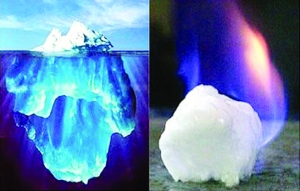Abe's energy enigma
- By Liu Yuanhai
 0 Comment(s)
0 Comment(s) Print
Print E-mail China.org.cn, May 6, 2013
E-mail China.org.cn, May 6, 2013
On April 26, Japanese Prime Minister Shinzo Abe finalized a plan for the commercial exploitation of seabed methane hydrate at a meeting at his residency. His government will also formulate a new Basic Act on Ocean Policy within five years.
Methane hydrate (CH4•5.75H2O) is a solid clathrate compound in which a large amount of methane made by Methanogen is trapped within a crystal structure of water. It gets its moniker "fire ice" from the fact that it resembles ice and is flammable. Due to its much lower CO2 emissions than petroleum and coal, methane hydrate is viewed by developed countries as an environmental friendly energy source.
|
|
|
Methane hydrate [File Photo] |
Of course, developed countries' interests in methane hydrate are based on their energy policies. Since the 1980s, affected by the Iran Islamic Revolution and the second oil crisis, economic growth in developed countries has changed from a high-speed and high-energy consumption model to a low-speed stable one. The rise of emerging economies, including China, has, however, pushed up global energy prices. With the development of economic globalization, the energy demands from emerging economies have put pressure on developed countries with regard to stable energy supplies. Therefore, Denmark, Germany, the U.K. and France have shifted their focus of energy exploitation from traditional sources to renewable, clean ones, such as solar energy, wind and tidal energy.
Similar to Western countries, Japan's energy structure has evolved from hydropower, coal and oil to nuclear power and natural gas. However, in contrast to the West's focus on new energy, Japan's energy policy focuses on improving the efficiency of traditional energy, especially remodeling production facilities which require high energy consumption.
However, with the restructuring of the Japanese economy from export-oriented to domestic consumption-oriented in the 1970s, rising domestic auto sales offset industrial energy savings. Although Japan has long been the world leader in the design and production of solar panels, its solar power industry has developed slowly as a result of the removal of subsidies to the industry. Those subsidies were only recently reintroduced.
Since the 1960s, the growth of nuclear power has balanced Japan's energy consumption structure. Before the Fukujima Daiichi Nuclear disaster in 2011, nuclear power accounted for one third of Japan's total power generation. But after the accident, public calls to abandon nuclear power have forced the government to halt plans to further develop nuclear fuel policies. Therefore, the government has had to increase electricity generated by natural gas and coal to meet the country's recent domestic consumption needs.
The cheap and stable energy supply is vital to Abe's administration and its goal of economic recovery. As a result, the Ministry of Industry and Economy conducted an overall exploration for methane hydrate in Japanese waters (including territorial waters and exclusive economic zones) recently. According to research done by governmental and non-governmental institutes over the course of more than three decades, it is thought that there are abundant supplies of methane hydrate in the waters around Japan. There is an estimated 7.35 trillion cubic meters of deposits, which can provide for the domestic consumption of natural gas for 96 years. And the test conducted on March 19 proved that Japan's viable technology can exploit methane hydrate under the seabed at depths of 500 to 1000 meters.
However, the greenhouse effect of methane gas is 20 times that of CO2, so domestic environmentalists are critical of methane hydrate's commercial development. In addition, the majority of methane hydrate deposits sit at depths of more than 1000 meters, making it difficult to undertake immediate large scale commercialization. As a result, the Japanese government is also tapping other marine resources, including oil, natural gas and rare earth. In 2008, Japan discovered oil and gas resources in open seas near Niigata with total deposits equal to that of a medium-scale oil gas field. The Abe administration exploited this in order to expand the exploration in its waters and EEZ, hoping to increase Japan's energy and resource self-sufficiency.
It is doubtful, however, given the feeble performances of previous governments, whether Abe's efforts towards energy self-sufficiency will be any more successful. Any workable project is likely to require consistent effort over the course of several generations, especially where tapping a seabed resource such as methane hydrate is concerned.
Nevertheless, it's hard to ignore Abe's references to China during his comments about Japan's marine resources development plan. With this in mind, it is not inconceivable that Abe may infringe China's maritime interests in the name of developing his country's marine resources.
The author is a researcher on the history of Northeast Asia and observer of Guancha.cn in Japan.
This article was translated by Li Shen. The original unabridged version was published in Chinese.
Opinion articles reflect the views of the authors, not necessarily those of China.org.cn.







Go to Forum >>0 Comment(s)